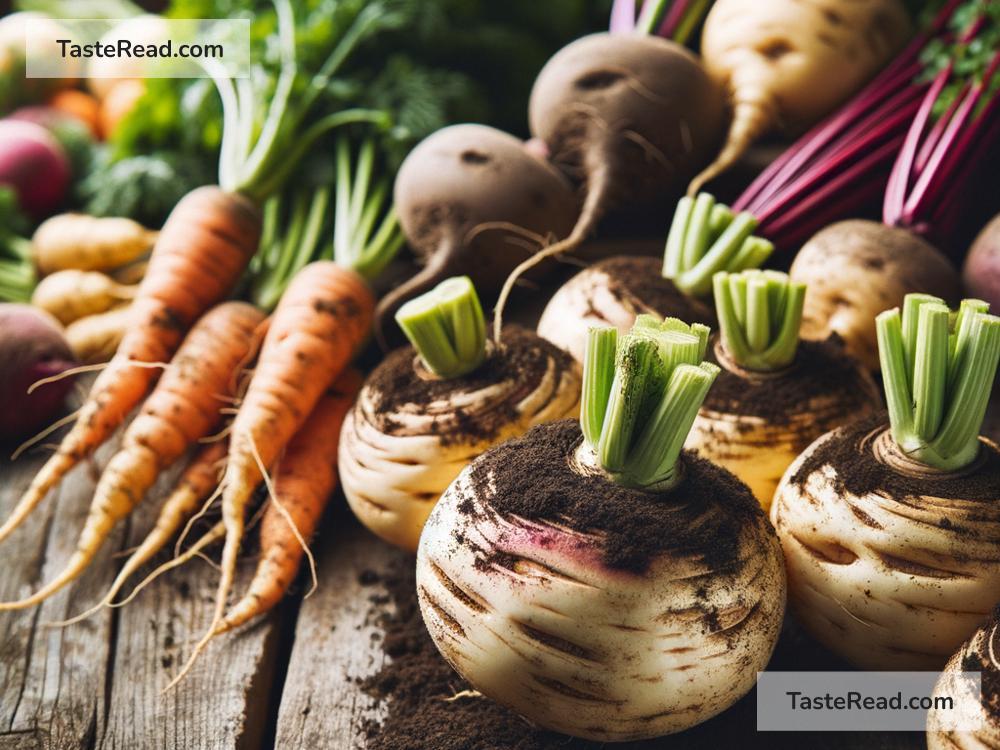The Science Behind the Earthy Taste of Root Vegetables Like Turnips
Root vegetables like turnips, carrots, and beets occupy a special place on plates around the world. They are packed with nutrients, easy to grow, and versatile in the kitchen. One of their most distinctive qualities, however, is the unique “earthy” taste they bring to soups, stews, and salads. If you’ve ever wondered why root vegetables taste like nature itself, this blog is for you! Let’s explore the science behind their earthy flavor in simple terms.
What Are Root Vegetables?
To start with, root vegetables are plants that store their energy underground, typically in their roots or bulbs. Examples include turnips, carrots, radishes, potatoes, beets, and sweet potatoes. These plants feed themselves by converting sunlight into energy through photosynthesis and then storing that energy in their roots. When we eat these vegetables, we’re essentially eating their nutrient-rich storage system.
Root vegetables are prized for their sweet, spicy, and earthy flavors. While sweetness comes from natural sugars like glucose, and spiciness comes from compounds like mustard oil (in radishes), earthiness has its own fascinating science.
What Causes the Earthy Flavor?
If you’ve eaten a turnip or beet, you’ve probably noticed that it tastes… well, like dirt — but in the best possible way! This earthy taste comes from geosmin, a natural organic compound.
Geosmin is the same compound responsible for the smell of fresh earth after it rains. It’s created by microorganisms, particularly certain types of bacteria and fungi in the soil. These microbes help decompose organic matter and release geosmin as part of their metabolic process. When root vegetables grow in the soil, they absorb this compound into their flesh through contact with the surrounding dirt and water.
Why Do We Notice Geosmin’s Flavor?
Humans are incredibly sensitive to geosmin. Research shows that we can detect geosmin even in tiny amounts — as little as 5 parts per trillion! This means even trace amounts of geosmin in a vegetable can deliver that unmistakable earthy flavor. For root vegetables like turnips and beets, geosmin enhances their natural taste, giving them that grounded, “fresh from the earth” vibe.
Interestingly, the perception of geosmin isn’t universal. Some people find it pleasantly earthy, while others may feel it tastes overly “dirty.” How you perceive geosmin may depend on your genetics, your taste preferences, and even cultural food habits.
Geosmin: A Friendly Compound?
Now, you might be wondering, is geosmin harmful? Absolutely not! Geosmin has no negative effects on your health. In fact, it’s perfectly safe to consume and is simply part of nature’s way of enriching the foods we eat. It’s worth noting that geosmin contributes to the subtle complexities of many foods, adding depth and character to their flavor profiles.
Plus, the presence of geosmin in root vegetables tells us that the plant interacted closely with healthy soil teeming with microbial life. This is often a sign of high-quality farming practices, where soil is fertile and full of beneficial organisms.
Other Factors Affecting Earthiness
While geosmin is the main contributor to the earthy taste of root vegetables, it’s not the only factor. Some vegetables, like turnips, also contain sulfur compounds that contribute to their slightly pungent and peppery taste. These sulfur compounds work alongside geosmin to give turnips their bold and complex flavor.
The type of soil the vegetables are grown in also plays an important role. Sandy, loamy soils often produce vegetables with a clean, crisp flavor, while heavier clay soils can enhance earthy elements. Additionally, farming techniques and how long the vegetables are exposed to moisture before harvesting can slightly alter their taste.
Can You Reduce the Earthy Taste?
If you’re not a fan of earthy flavors, there are ways to mellow them out in cooking. For example, soaking turnips and other root vegetables in cold water before cooking can help remove some of the geosmin that stays on the surface. Roasting, boiling, or adding sweet and acidic flavors (like honey, vinegar, or citrus) can also balance out the earthiness.
For people who use root vegetables purely as natural flavor enhancers in soups or stocks, peeling the vegetable before cooking can minimize the earthy taste.
Why Do We Love It?
While not everyone enjoys earthy flavors, many people find them grounding and comforting. The taste of root vegetables reminds us of their connection to the soil and the natural cycles of growth. In fact, chefs and food enthusiasts often celebrate the earthy elements in these vegetables for their ability to make dishes feel rustic, authentic, and nourishing.
Turnips, with their peppery bite and subtle earthiness, are often paired with creamy textures in soups or roasted with bold spices to highlight their unique flavor. When you eat them, you’re tasting not just the vegetable itself, but also the environment it grew in — an invisible handshake between soil, microbes, plants, and humans.
Conclusion
Root vegetables like turnips, beets, and radishes are packed with flavor, nutrition, and history. Their earthy taste comes from geosmin, a compound gifted to them by soil-dwelling microorganisms. This unique quality makes them a favorite in kitchens around the globe, whether used in hearty winter soups or fresh summer salads.
The next time you bite into a turnip or beet and taste that unmistakable flavor, take a moment to appreciate the science behind it. Your food traveled through nature’s underground network, gathering nutrients and the distinct taste of the earth. That’s pretty amazing, don’t you think?
So, whether you love or dislike the earthy bite of root vegetables, one thing is certain — understanding their flavors helps us connect deeper to the food we eat and the planet we live on.


